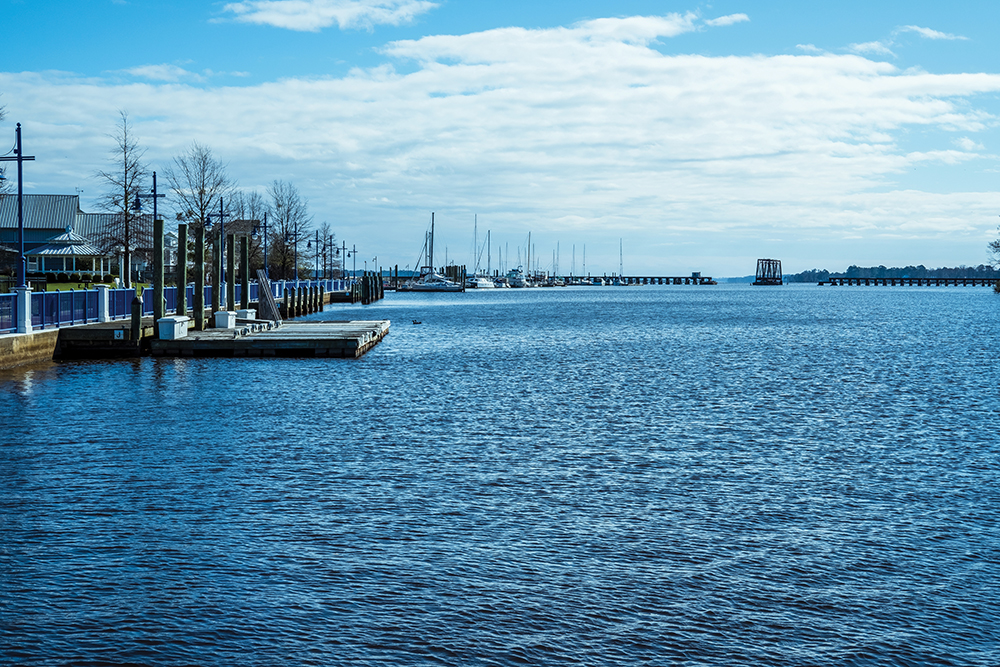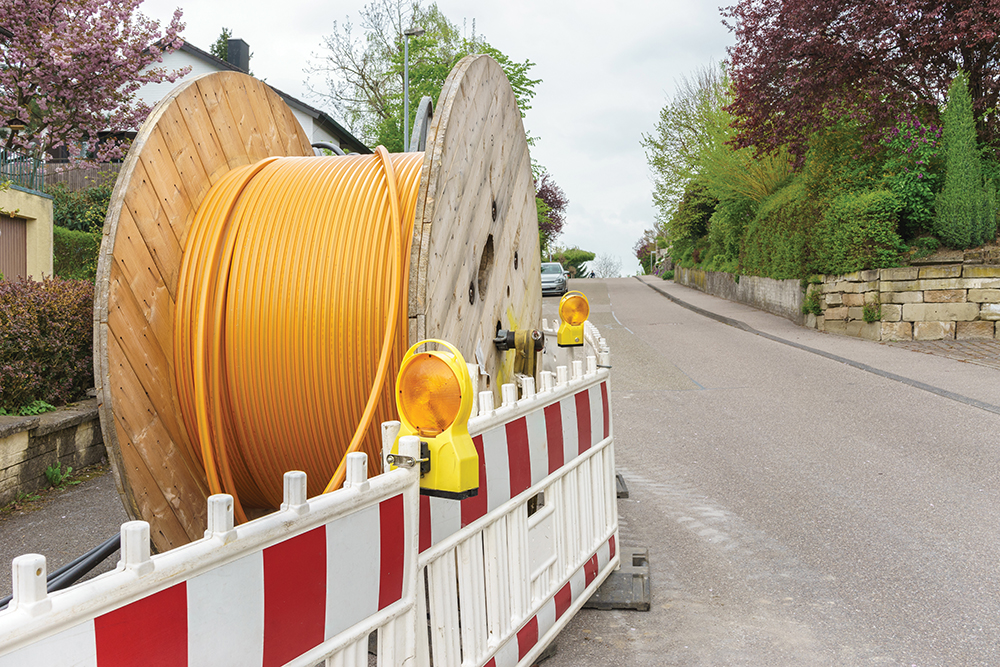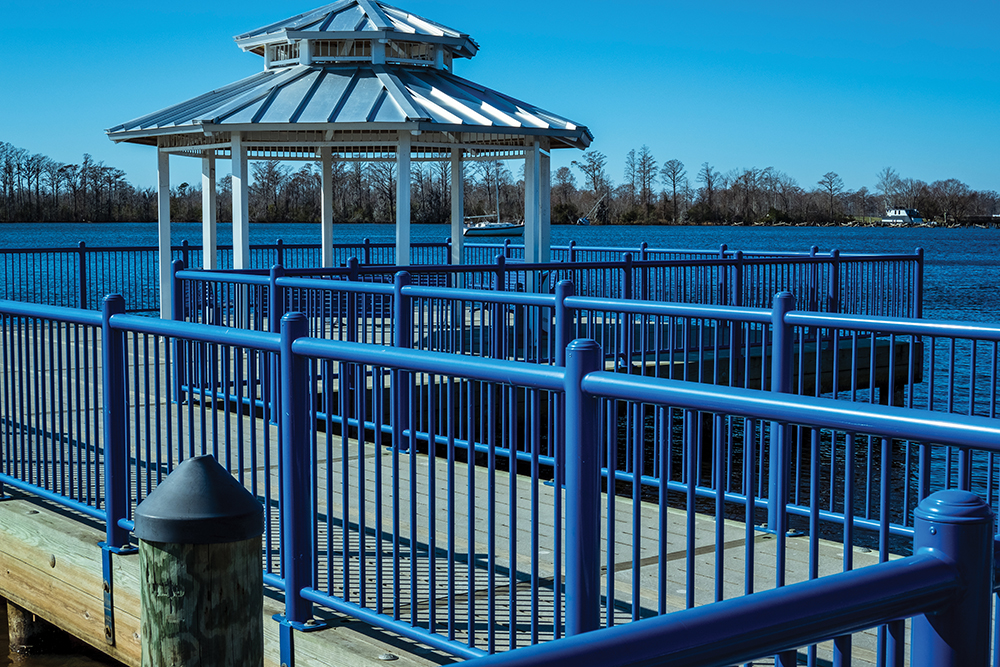Under current legislation, almost nothing—not even hopeful new providers or already-built infrastructure—can resolve the internet problem in North Carolina. The City of Washington is now finding that out firsthand.
The City of Washington has an expansive fiber network with the capacity to provide high-speed internet to each of its citizens. Yet, it sits mostly dormant, unused for that purpose.
It exists for communication needs: police, emergency response, street lights and other public goods. Those uses, though, make up only a percentage of the fiber’s bandwidth. The remaining capacity is unlit.
It’s a prohibited solution to a far-reaching problem. Across the state, communities that lack reliable access to high-speed internet often reside atop the already-built infrastructure that could provide it. Other states have encouraged arrangements that tap into that resource. Virginia, for example, allows cities to operate “open access” models, where private internet service providers can partner with the municipality to use its infrastructure, rather than building out their own. Arkansas also recently passed legislation that would allow for similar public-private partnerships, and it passed unanimously.
In North Carolina, though, those partnerships are blocked. Legislation, often referred to as “The Level the Playing Field Act,” passed in 2011 following the implementation of the City of Wilson’s municipal-run Greenlight internet, and introduced a web of restrictions that had the effect of prohibiting any additional municipal-run systems or the expansion of existing ones.
It also restricted less intensive measures, including public-private partnerships in which cities would not actually run retail internet service, but rather build and lease infrastructure to private providers.
As a consequence, the broadband market is near-impossible to tap. One potential new service provider is discovering this conundrum in Washington now.
˘˘˘
 What’s important to remember is that broadband and internet service in North Carolina is a private good with profit motives. It is not regulated as a public utility. Typically, fiber or wireline technology that provides homes with internet access is owned and operated by a private company, and the monthly bills paid by customers provide their revenue. And though this seems like an obvious point, it’s necessary to reiterate because in this privately-run model, the only entities that can improve internet access are the companies. The motives are profit, not public service.
What’s important to remember is that broadband and internet service in North Carolina is a private good with profit motives. It is not regulated as a public utility. Typically, fiber or wireline technology that provides homes with internet access is owned and operated by a private company, and the monthly bills paid by customers provide their revenue. And though this seems like an obvious point, it’s necessary to reiterate because in this privately-run model, the only entities that can improve internet access are the companies. The motives are profit, not public service.
In a well-functioning market, the citizens would have the power of choice. One service is poor, so they’ll go to another. One service is cheaper, one has better customer service, one is more reliable—that option gets selected. This is how competition yields positive results for consumers.
In the internet market in many areas of North Carolina, this check does not exist. There is no choice, because the barrier to entry is too high for any competing company. What’s left is one or two providers with no incentive to improve service, and a community of people with nowhere else to turn.
In Washington, customer dissatisfaction reached a point where Mayor Donald Sadler wrote to N.C. Attorney General Josh Stein regarding the issue.
“The City of Washington receives constant complaints regarding poor service from this provider,” wrote Mayor Sadler on January 4, 2021, then listing the range of issues raised by customers: “Escalating costs, lack of access to service, excessively long outages, poor communications and response to outages, failure to keep equipment in good working condition, temporary fixes resulting in unburied/low handing lines for extended period of time, internet speeds substantially slower than advertised, etc.”
Washington’s problem is by no means unique. In writing that letter, Mayor Sadler joined New Bern and Tarboro and, later, nine other local governments in officially raising concerns about Suddenlink. Throughout North Carolina, stories abound of students flocking to fast food parking lots to use Wi-Fi, farmers struggling to acquire reliable internet connections to conduct their business and, especially during the pandemic, employees being unable to adequately work from home.
The Institute for Local Self-Reliance highlighted this issue in its 2018 report Profiles of Monopoly: Big Cable and Telecom. “The market has spoken: The market is broken,” reads the opening line. The report, updated with data through 2020, concludes that in total, at least 83.3 million Americans can access broadband through only a single provider. “Millions of Americans still do not have a real choice when it comes to their Internet service. In urban areas, a relative majority can choose between two or more providers—usually the monopoly cable company and the often slower monopoly phone company. In rural areas the situation is worse.”
Why can’t an outside company come in and provide better service? Some are trying, including RiverStreet Networks, a subsidiary of the telephone cooperative Wilkes Communication. Their story provides a good example of the market’s impenetrability.
Greg Coltrain is the company’s vice president of business development, and notes that as part of a telephone co-operative, they have different incentives than the large telecoms. “Our mission is to serve the unserved,” Coltrain says, though he notes that RiverStreet is a for-profit arm of the organization. “In our cooperative areas, our customers are called members and are treated as owners. We’ve built our business around treating our for profit areas with the same pricing, service and support.” They focus on the unserved, primarily addressing the most rural parts of the state to build networks in counties that have no infrastructure already in place.
While beneficial for those communities, it also makes sense financially. With these projects, they aren’t entering a crowded market, so their costly investment into infrastructure is less risky, even when charging reasonable access rates.
No such sensible options exist in Washington, according to Coltrain.
“Our method to all this madness with broadband is to try to equalize the cost by utilizing partnerships,” Coltrain said. “Washington is saying, ‘Well, we’ve got fiber assets we’d love to let you use.’ But we can’t.”
 As a result, RiverStreet Networks is facing problems at both the county and city level. After winning an RFP from Beaufort County earlier in 2021, their first target was unserved rural areas outside of the municipal boundaries. Geography, though, dictated that lines would likely have to traverse the city, as Washington rests on the narrowest point of the Pamlico River. They needed to connect through the city, without being able to partner with the city. This is the first instance of running up against the legal restrictions.
As a result, RiverStreet Networks is facing problems at both the county and city level. After winning an RFP from Beaufort County earlier in 2021, their first target was unserved rural areas outside of the municipal boundaries. Geography, though, dictated that lines would likely have to traverse the city, as Washington rests on the narrowest point of the Pamlico River. They needed to connect through the city, without being able to partner with the city. This is the first instance of running up against the legal restrictions.
For this problem, there are a few options available to RiverStreet, though Coltrain admitted that there is almost no method to do so that makes financial sense. They could lease connectivity from the other private providers in the area, Suddenlink or Centurylink—an ‘A’-to-‘B’ connection called a “transport”—or through the nonprofit fiber provider MCNC, but both would carry a high premium. Or, and perhaps least cost effective, they could lay their own fiber lines.
“If getting to the unserved area doesn’t make business sense, then they stay unserved,” Coltrain said.
To serve citizens residing in the city, the problem is even trickier. They’d only have that final option—laying their own fiber even as Washington has unused capacity to meet the need. No alternative illustrates the market-entry dilemma quite like this situation, because it means that if RiverStreet were to invest in physical infrastructure, the fiber lines they laid would very likely rest right on top of the public network already in the ground.
“We might lay this fiber right beside where the city already has fiber sitting there—dark fiber, that’s just sitting there,” Coltrain said. “So, you know, it’s a waste of money.”
Redundancy aside, that option has little hope of succeeding for RiverStreet, Coltrain notes, since market forces would react. Even if customers flocked to their business, it would be relatively cheap for the current providers at that point to then improve their service or reduce their current prices, and thus win customers back. This makes the venture too risky for a new company, so it becomes cost prohibitive. “We put ourselves at a risk to try to go in there and invest our capital,” Coltrain said. “It’s not really in our business model.”
The intervention, then, according to Christopher Mitchell, Director of the Community Broadband Networks Initiative at the Institute for Local Self-Reliance, would be a public one. It is to leverage the existing assets.
“It’s now been 25 years of hoping the private sector would develop competition on its own, and it has not,” Mitchell said.
The arguments against this intervention do not have merit, according to Mitchell. Those are that, one, government should not be in the broadband business and two, the telecommunication companies are operating on their own networks, and allowing local governments to share its infrastructure puts the telecoms at an unfair competitive disadvantage. The 2011 law itself is clear on this point, stating that its restrictions are “necessary to ensure that the State does not indirectly subsidize competition with private industry through actions by cities…”
“Most telecommunications companies in the United States were built with some sort of government support,” Mitchell said, noting that Suddenlink is included among the beneficiary companies. “[That] is an important fact to consider when judging what is a fair playing field today. There are very few companies that compete today that did not receive some significant government boost for their business plans over the years. It’s hypocritical to complain that government cannot now intervene to ensure everyone has high quality broadband access.”
˘˘˘
 Just down the road, New Bern Mayor Dana Outlaw is contending with the same issue. As one of the cities that wrote to Attorney General Stein in January, Outlaw has continued his advocacy on this issue throughout 2021, and published an op-ed on the topic in late April.
Just down the road, New Bern Mayor Dana Outlaw is contending with the same issue. As one of the cities that wrote to Attorney General Stein in January, Outlaw has continued his advocacy on this issue throughout 2021, and published an op-ed on the topic in late April.
“That cities and towns are not free under current state law to more fully explore using their own assets to partner with private internet companies is simply unacceptable given what is at stake,” Outlaw wrote, adding that the city receives so many complaints regarding internet service in the area, that they’ve established a separate citizen portal just for that topic.
Outlaw also references the monopolistic conditions at play. “At its core, the problem faced by eastern North Carolina is a lack of competition,” Outlaw wrote. “Firms like Suddenlink operate as de facto monopolies in many areas of our towns and cities, with consumers unable to bring market pressures to bear that would lead to service improvements and better pricing.”
Washington City Manager Jonathan Russell echoes Outlaw’s sentiments. Speaking on the broadband standstill his city faces, he is clear that he doesn’t prefer any specific provider, nor hopes to “get into the broadband business.” Rather, he simply wants competition to be introduced.
“The lack of competition in the market is slowing down progress. The legislation in place is limiting that competition,” Russell said. “We’re not lobbying for one provider over another. We just want to give citizens a variety of choices.”














